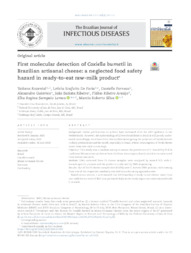First molecular detection of Coxiella burnetii in Brazilian artisanal cheese: a neglected food safety hazard in ready-to-eat raw-milk product.
First molecular detection of Coxiella burnetii in Brazilian artisanal cheese: a neglected food safety hazard in ready-to-eat raw-milk product.
Author(s): ROZENTAL, T.; FARIA, L. S. de; FORNEAS, D.; GUTERRES, A. L.; RIBEIRO, J. B.; ARAUJO, F. R.; LEMOS, E. R. S.; SILVA, M. R.
Summary: Global publications on Q fever have increased after the 2007 epidemic in the Netherlands. However, the epidemiology of Q fever/coxiellosis in Brazil is still poorly understood. Accordingly, there have been few studies investigating the presence of Coxiella burnetii in dairy products around the world, especially in Brazil, where consumption of fresh cheese made from raw-milk is very high. Objective: This study was a random survey to assess the prevalence of C. burnetii by PCR in traditional Minas artisanal cheese from the Serro microregion, Brazil, which is manufactured from bovine raw-milk. Methods: DNA extracted from 53 cheese samples were analyzed by nested PCR with C. burnetii-specific primers and the products confirmed by DNA sequencing. Results: Out of the 53 cheese samples five (9.43%) were C. burnetii DNA-positive, each coming from one of the respective randomly selected manufacturing agroindustries. Based on our results, it is estimated that 1.62 tons/day of ready-to-eat cheese made from raw-milk from a total of 16.2 tons produced daily in the study region are contaminated with C. burnetii.
Publication year: 2020
Types of publication: Journal article
Unit: Embrapa Dairy Cattle
Observation
Some of Embrapa's publications are published as ePub files. To read them, use or download one of the following free software options to your computer or mobile device. Android: Google Play Books; IOS: iBooks; Windows and Linux: Calibre.
Access other publications
Access the Agricultural Research Database (BDPA) to consult Embrapa's full library collection and records.
Visit Embrapa Bookstore to purchase books and other publications sold by Embrapa.

